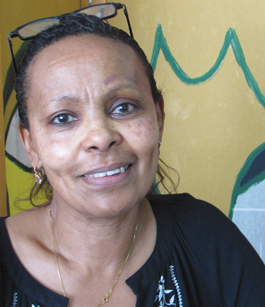home | north bay bohemian index | sonoma, napa, marin county restaurants | preview

Photograph by Suzanne Daly INJERA INJECTION: Wodi Merso began cooking as a young girl in a family of 12 in northeastern Ethiopia.
Ethiopian Ether
Abyssinia Restaurant spices up Santa Rosa
By Suzanne Daly
"Exotic" is a word not often used to describe Santa Rosa, but the Ethiopian cuisine at Abyssinia Restaurant transports diners from a nondescript stretch of Fourth Street to the spice markets of the East African highlands. Inside, the green, yellow and red striped curtains hand-woven in Ethiopia echo the colors of the national flag, and goatskin paintings of Emperor Haile Selassie and colorful basketry decorate the walls of this family-run business.
Owner and chef Wodi Merso was born into a family of 12 children in Wollo, Ethiopia, and attended school in the capital city, Addis Ababa. She started cooking at an early age, learning the basics on both the open charcoal fire and gas stove in her family's kitchen. "It's traditional for little girls to learn to cook, and they start by learning easy tasks, like making coffee and sauces," says Merso. "The girl who knows how to cook well has prestige. Cooking in our culture is the definition of how good of a woman you are, even more than the way you handle yourself. Cooking is something you have to know."
Merso married young and became a mother before the age of 20. After earning a degree in science, she worked at an electrical company for 10 years in Addis Ababa while raising five children. When civil war wracked Ethiopia in the early '90s, the family left the country and sought political asylum in Washington, D.C. "Everything you know and have you leave behind, and you have to start again empty-handed," Merso rues.
Sixteen years later, Merso moved to California. As she looked for jobs, the hard work of running a restaurant wasn't on her list. Yet a restaurant business became available at a deal too good to pass up, with an initial plan to run Abyssinia for just a short time. "In fact, for some reason, I enjoy it," Merso says with a smile. "I love cooking for my family. Cooking is an art. At the same time, I introduce my culture and my country to other people."
Merso points out that Abyssinia is the only Ethiopian restaurant in the North Bay, and that the "short time" has quickly stretched to three years. Merso and her sons all work at the restaurant, sharing all jobs involved.
All the dishes served at Abyssinia are made from scratch and are freshly prepared each day. Some ingredients are imported from Ethiopia, including spices, honey wine, beer and grains such as teff, a native grass used to make injera, the slightly sour and very airy flatbread that serves as a bed for most of the spicy, saucy meat or vegetable dishes. (Merso tones down the spiciness of her sauces, accounting for American palates unaccustomed to the heat.) The menu offers a short primer on eating in the traditional fashion, using small pieces of injera instead of a fork to scoop up the food.
"Food is an introduction into our traditions," says Merso. "You can tell where a person is from by the way he eats, more than the way he talks. To try our food, you have to be adventurous. Some people are afraid to touch the food with their hands, but it's funny because they touch it with their mouths. I say this, the hand, came before the metal of the fork."
She notes that in Ethiopian culture, people eat together and share the same meal on the same plate, while in American culture we all want our own plate and sometimes won't eat if we have to share our food. "The longest journey is from here, the plate, to here, the mouth," Merso says, gesturing with her hands. "People who are open-minded like our food. Regulars come in every day, and I know what they like. Mostly, I love the kids who are five to six years old, who were picky eaters but now love our food."
Although Merso offers only a few of the 200-300 traditional dishes she has mastered, vegetarians and carnivores alike have a wide range of flavors to sample. Appetizers include different dips made with lentils or garbanzo beans ($4.50-$5), and sambusas ($5), the hot, flaky pastries filled with a choice of lentils or ground beef, both deliciously spiced. Diners can try a sampler of dishes by ordering the vegetarian ($11.95 single serving, $19.95 double) or Abyssinian combo ($12.95 single or $20.95 double), which includes spicy chicken, beef, and lamb stews. Both combos come with salad, vegetables and additional injera to sop up the exotic sauces. For dessert, there's baklava ($3.50), a Middle Eastern influence which has seeped onto the menu via the Arabic countries that share borders with Ethiopia.
Happily for locals, Merso is now thinking long-term, hoping for a larger space in a location where she can host live music and offer a full bar. "I like to cook, but I never thought that I'd open a restaurant," she says. "Cooking is warming a house and making it your home."
Abyssinia Ethiopian Restaurant, 913 Fourth St., Santa Rosa. Open Wednesday-Monday, lunch and dinner. 707.568.6455. www.my-abyssinia.com.
Send a letter to the editor about this story.
|
|
|
|
|
|